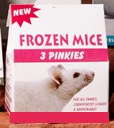
Emerging
Infectious Disease
Christine
L. Case
CDC is collaborating with 22 state health departments in an ongoing investigation of an outbreak of human Salmonella I 4,[5],12:i:- infections associated with exposure to rodents sold as food for pet reptiles and amphibians (i.e., feeder rodents).
During August 29, 2011–February 2, 2012, a total of 46 cases of human Salmonella I 4,[5],12:i:- infection were reported in 22 states. The median patient age was 11 years (range: <1–69 years); 37% were aged ≤5 years, and 52% were male. Of the 27 patients interviewed, six (22%) reported hospitalization, 20 (74%) reported reptile or amphibian exposures, and 15 (56%) reported feeder rodent exposure. For 12 patients who recalled the types of rodent contacted, five (42%) reported exposure to live rodents, four (33%) to frozen rodents, and three (25%) to both live and frozen rodents. Seven (58%) patients reported exposure to mice, two (17%) to rats, two (17%) to both mice and rats, and one (8%) was unsure. No patients reported exposure to rodents purchased from the same pet store.
Frozen mice specimens from two North Carolina pet stores where two patients purchased feeder rodents yielded the outbreak strain. Tracing the source of these mice has been difficult for investigators because of complex breeder and supplier networks and inadequate records. However, two breeders supplying pet stores from which patients had purchased rodents had received mice from the company implicated in the 2009 and 2010 outbreaks. Given the wide distribution of illnesses, rodent suppliers, and pet stores, the outbreak strain might now be endemic in feeder rodents.
The fact that 37% of patients were aged ≤5 years supports recommendations that young children avoid exposure to reptiles or amphibians, including in the home (3). Owners of reptiles, amphibians, or other animals that are fed rodents should be aware of the risk for salmonellosis from the animals and live and frozen feeder rodents. Safe handling instructions for all of these animals should be provided at the point of sale.